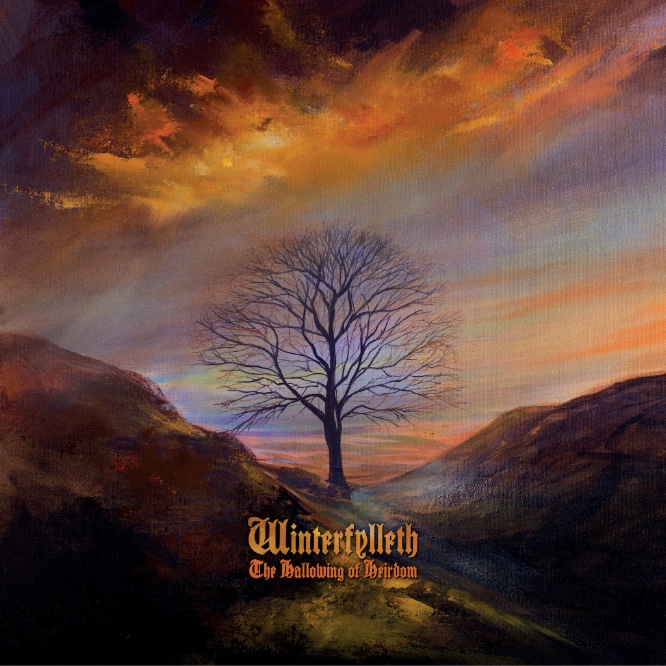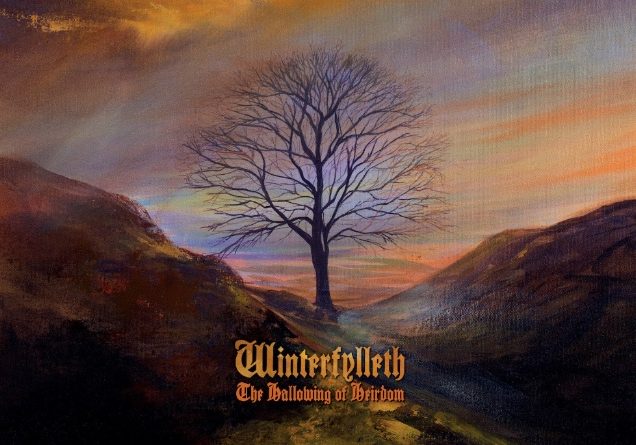ALBUM REVIEW: The Hallowing of Heirdom – Winterfylleth
English black metal brigade WINTERFYLLETH have never hidden their love of England’s green and pleasant land and, for their latest album, have chosen to celebrate its rich history in The Hallowing of Heirdom, an entirely acoustic folk album. This may surprise long-term fans, but it isn’t quite the radical departure from the norm it might seem. In fact, it’s a seamless evolution of their fundamental brand. More than that, though, it’s arguably the best album they have yet produced.
On the one level, yes, it isn’t very often that a band famous for atmospheric black metal diverts into a completely different genre. Plenty of bands have flirted with different styles – SLAYER and nu metal, for example – but it’s unusual to see a completely different genre being trialled not just on one or two songs, but across an entire album. However, WINTERFYLLETH haven’t just pulled a complete left-turn into folk music. They’ve been laying the groundwork for this album since the beginning. On their very first album The Ghost of Heritage, they gave listeners the wonderful The March to Maldon. Granted, that track is more of a lengthy intro to Brithnoth: The Battle of Maldon (991 AD), but the point stands. On each subsequent album save for The Dark Hereafter, the group has taken the time to craft an acoustic folk track. When asked to contribute to the compilation One And All, Together, For Home, they were the only band whose songs were pure folk music. With this history, and guitarist Dan Capp’s recent work on the (unrelated) WOLCENSMEN project, it shouldn’t really be much of a surprise that their latest album is comprised solely of folk music.
And what incredible music it is. Rather than taking the neofolk route, like WOLCENSMEN, they have created compositions that cut much closer to previous works like The World Ahead or Children of the Stones. As an example, take Halgemonath (a corruption of the Anglo-Saxon word for September). It sounds, at a base level, rather like the kind of song farmhands might have listened to around a fire after a good day’s work at harvest. As a word, it translates roughly to ‘holy month’, which in the pastoral, medieval landscape, September arguably was. Taking these together, what it really evokes is the autumn sunset, that almost sacred time of rich, warm colours bathing the fields of corn and the workers in light. This, in part, is what the album is really about: honouring nature, and how important it is.
Musically, it’s a delicately layered composition on guitars, laid over the gently percussive sounds of a tambourine and the brooding, atmospheric keyboards of Mark Deeks. It fits seamlessly with the rest of the album. The majority of the music is played on acoustic guitars, with the moving choral harmonies of the vocalists deployed to excellent effect on tracks like The Shepherd (a musical setting of a famous poem by Shakespeare contemporary Christopher Marlowe) and lead single Elder Mother. The breath-taking talents of renowned cellist JO QUAIL and violinist VICTORIA BERNATH are threaded throughout to great effect: Elder Mother and the title track are particularly notable exhibits of the beauty these two can conjure. The rich, warm sounds of the cello lend a particularly earthy atmosphere to the tracks on which it is featured, rounding out the sound with a real depth in the bass harmonies.
The title track also exemplifies the other important theme of the album: honouring England’s history, and using it as a guide to our future. To “hallow” something means to ‘honour as holy’: so the title roughly translates as ‘rendering holy our history’. Arguably, this album is the culmination of everything they have been working towards from the beginning. The band’s name is taken from the Anglo-Saxon word for October. All of WINTERFYLLETH‘s albums have songs which focus on aspects of Anglo-Saxon history and folklore, and The Hallowing of Heirdom is no exception. Frithgeard, for example, takes its name from a sort of sacred grotto. Rites of worship may have occurred there, and oaths sworn, and the song itself sounds like the kind of music associated with such rituals.
On The Mercian Sphere, songs like When The Woods Were Young echo this kind of theme, evoking an almost holy atmosphere in the imagery of woodlands in its music. Even the name of their debut album foreshadows this: The Ghost of Heritage has now come full circle to be hallowed, honoured rather than feared. But history is not only to be hallowed. Truly honouring history must by necessity go beyond merely respecting it and lead into learning from it, something humans are notoriously bad at doing. During the title track, the question ‘who are we now?’ is given explicit voice. It isn’t one the album sets out to answer, but it is one that all listeners must ask themselves. When looking at our history – recent, ancient, and medieval – who are we? Are we the strange and wonderful creatures our ancestors imagined we might be? Are we living up to our potential? Or are we as mired as we ever were in pointless bickering over plots of land large and small?
That it is a folk album may surprise some fans, but The Hallowing of Heirdom is without a doubt the best work WINTERFYLLETH have put out in their career so far. Not only is it a well-realised meditation on the band’s abiding concerns, but the music through which these themes are examined and delivered is incredible. Delicate and breath-taking, rich and warm, deep and brooding, all in equal measure, it is an absolute masterpiece.
Rating: 9/10

The Hallowing of Heirdom is out now via Candlelight/Spinefarm Records.
Like WINTERFYLLETH on Facebook.

